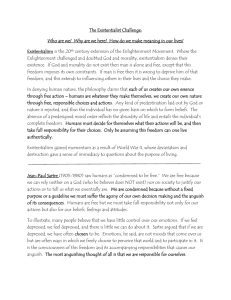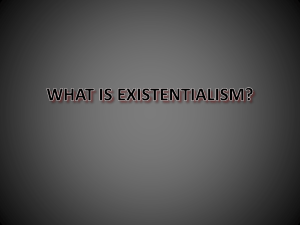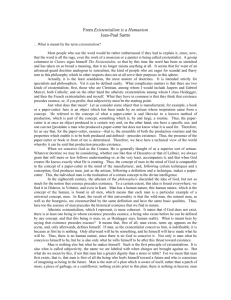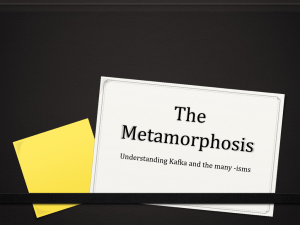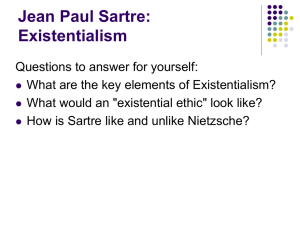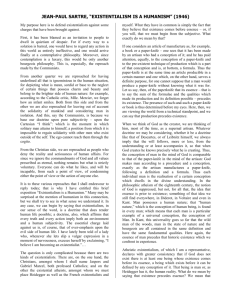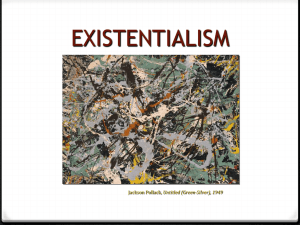OCR Document
advertisement
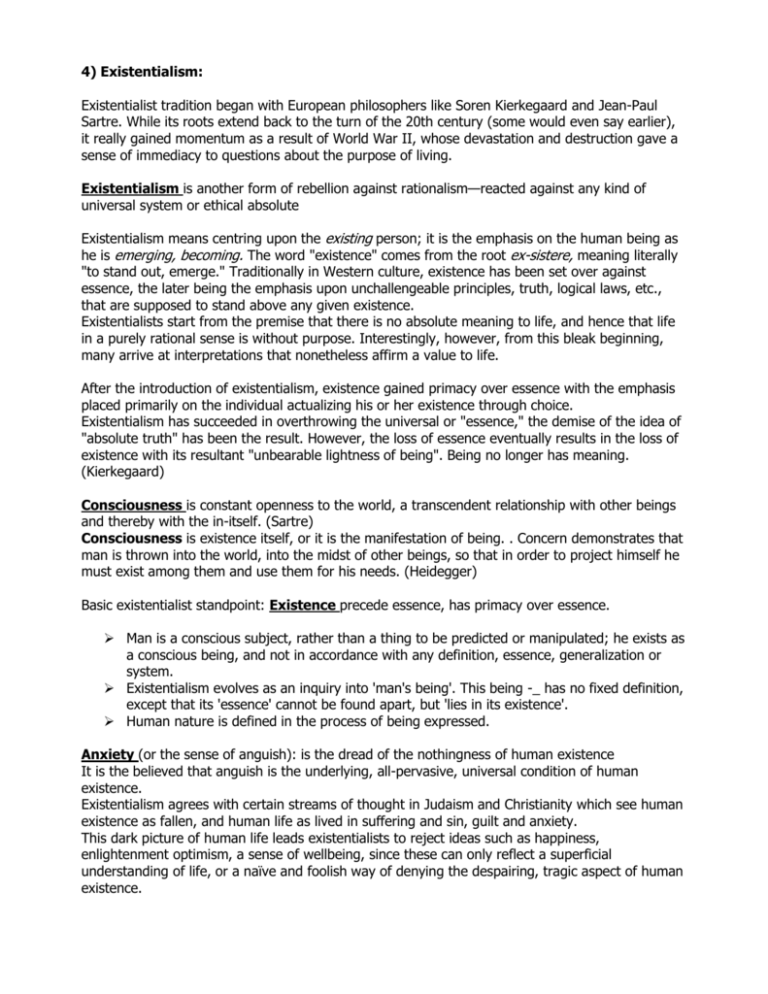
4) Existentialism: Existentialist tradition began with European philosophers like Soren Kierkegaard and Jean-Paul Sartre. While its roots extend back to the turn of the 20th century (some would even say earlier), it really gained momentum as a result of World War II, whose devastation and destruction gave a sense of immediacy to questions about the purpose of living. Existentialism is another form of rebellion against rationalism—reacted against any kind of universal system or ethical absolute Existentialism means centring upon the existing person; it is the emphasis on the human being as he is emerging, becoming. The word "existence" comes from the root ex-sistere, meaning literally "to stand out, emerge." Traditionally in Western culture, existence has been set over against essence, the later being the emphasis upon unchallengeable principles, truth, logical laws, etc., that are supposed to stand above any given existence. Existentialists start from the premise that there is no absolute meaning to life, and hence that life in a purely rational sense is without purpose. Interestingly, however, from this bleak beginning, many arrive at interpretations that nonetheless affirm a value to life. After the introduction of existentialism, existence gained primacy over essence with the emphasis placed primarily on the individual actualizing his or her existence through choice. Existentialism has succeeded in overthrowing the universal or "essence," the demise of the idea of "absolute truth" has been the result. However, the loss of essence eventually results in the loss of existence with its resultant "unbearable lightness of being". Being no longer has meaning. (Kierkegaard) Consciousness is constant openness to the world, a transcendent relationship with other beings and thereby with the in-itself. (Sartre) Consciousness is existence itself, or it is the manifestation of being. . Concern demonstrates that man is thrown into the world, into the midst of other beings, so that in order to project himself he must exist among them and use them for his needs. (Heidegger) Basic existentialist standpoint: Existence precede essence, has primacy over essence. Man is a conscious subject, rather than a thing to be predicted or manipulated; he exists as a conscious being, and not in accordance with any definition, essence, generalization or system. Existentialism evolves as an inquiry into 'man's being'. This being -_ has no fixed definition, except that its 'essence' cannot be found apart, but 'lies in its existence'. Human nature is defined in the process of being expressed. Anxiety (or the sense of anguish): is the dread of the nothingness of human existence It is the believed that anguish is the underlying, all-pervasive, universal condition of human existence. Existentialism agrees with certain streams of thought in Judaism and Christianity which see human existence as fallen, and human life as lived in suffering and sin, guilt and anxiety. This dark picture of human life leads existentialists to reject ideas such as happiness, enlightenment optimism, a sense of wellbeing, since these can only reflect a superficial understanding of life, or a naïve and foolish way of denying the despairing, tragic aspect of human existence. Absurdity: "I am my own existence, but this existence is absurd". To exist as a human being is inexplicable, and wholly absurd. Each of us is simply here, thrown into this time and place - for no reason, without necessary connection, only contingently. Nothingness (or the void): We exist in relation to nothing. "If no essences define a person/human being, and if, then as an existentialist, one rejects all of the philosophies, sciences, political theories, and religions which fail to reflect one's existence as conscious being and attempt to impose a specific essentialist structure upon oneself and their world, then there is nothing that structures their world. If one stripped themselves of all unacceptable structure, the structures of knowledge, moral value, and human relationship, they would stand in anguish at the edge of the abyss." Death: the unaware person tries to live as if death is not actual, he tries to escape its reality. Some existentialists believe that death is the most authentic, significant moment, one's personal potentiality, which one alone must suffer. If one takes death into their life, acknowledge it, and face it squarely, one will free themselves from the anxiety of death and the pettiness of life - and only then will one be free to become themselves. (Heidegger) Other existentialists, such as Jean-Paul Sartre, believe that death is total nonexistence. Death is as absurd as birth - it is no ultimate, authentic moment of one's life, it is nothing but the wiping out of one's existence as conscious being. Death is only another witness to the absurdity of human existence. the possibility of death isolates individuals because it continuously weighs upon existence to understand this possibility means to decide for it, to acknowledge "the possibility of the impossibility of any existence at all" and to live for death Alienation (or estrangement): the alienation of individual human beings who pursue their own desires in estrangement from the actual institutional workings of their society. alienated from the social system, they do not know that their desires are systemdetermined. And there is the alienation of those who do not identify with the institutions of their own society, who find their society empty and meaningless. There is the alienation which develops in civil society between the small class of the wealthy and the growing discontent of the large class of impoverished workers Most profound alienation is the alienation between one's consciousness and its objects, in which one is aware of the otherness of the object and seek in a variety of ways to overcome its alienation by mastering it, by bringing it back into oneself in some way. Also, alienation from nature because of science (by specialized and mathematicized concepts, laws, theories and technologies); estranged from human institutions (bureaucratized government on the federal, state, and local levels, national political parties, business corporations, national religious organizations) - we neither feel that we are part of them nor we can understand their workings - We no longer have a sense of having roots in a meaningful past nor do we see ourselves as moving toward a meaningful future: - As a result, we do not belong to the past, to the present, or to the future. The existentialists point out that all of our personal human relationships are poisoned by feelings of alienation from any "other".
